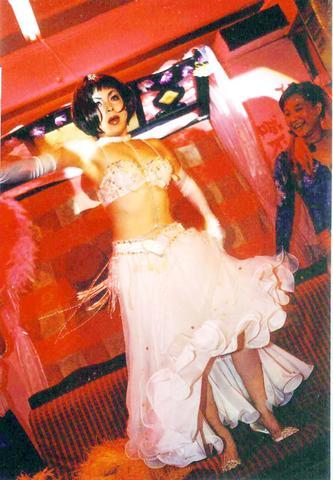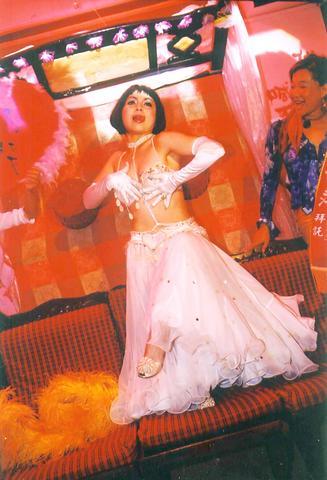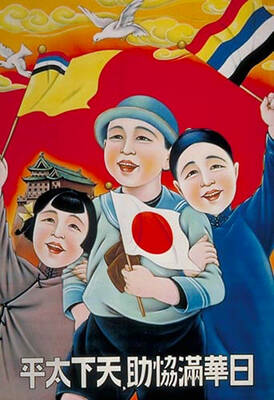The oldest profession in the world will take center stage this weekend in Taipei with the 4th International Sex Workers Culture Festival (國際娼妓文化節) highlighting the plight of workers in the profession and the many associated social, political, health and economic issues related to prostitution.
Organized by the Collective of Sex Workers and Supporters (COSWAS, 日日春關懷互助協會), events set to take place over the next four days have been given the label of a festival, though the series of seminars, workshops and tomorrow's march have serious undertones that are hard to equate with the carefree spirit of a carnival.
The sex industry has been the source of heated debate since the Ministry of the Interior on Jan. 6 announced a reform plan that reportedly would decriminalize most aspects of the industry and even raised the possibility of establishing red-light districts. This Wednesday, however, the director of the ministry's Department of Social Affairs Chiu Ju-na (邱汝娜) responded at a protest action by the Garden of Hope Foundation (勵馨社會福利事業基金會) by saying the report in the China Times (中國時報) had overstated the reform proposal and that the ministry was currently only considering decriminalizing sex workers.

PHOTO COURTESY OF COSWAS
If this first-step reform ultimately is approved, it would end one of the only issues on which COSWAS and the Garden of Hope Foundation find common ground, namely that the current practice of fining and jailing prostitutes, but not their customers, is wholly unjust. Secretary of COSWAS Chung Chun-chu (鐘君竺) said the current system lends itself to abuse from police, customers and prostitutes alike.
"Police officers will pay prostitutes to report on other prostitutes to reach their arrest quotas. Or the cops will simply give a man money and then follow him to the location or show up at an appointed time," Chung said.
Issues such as these will get a full airing during two open debates at Taipei City Council set to take place today at 1pm and Monday at the same time. To help back the case of local sex workers, COSWAS has invited representatives of sex-worker unions from England, Cambodia and Thailand, as well as human rights and women's rights activists from the US, Singapore and Hong Kong to discuss the varied experiences of sex workers in achieving the decriminalization of their trade.

PHOTO COURTESY OF COSWAS
Two workshops set to take place tomorrow and Sunday at Taipei Artist Village (admission for women only) have been designed to perform and teach erotic dancing techniques. "These are very popular events because most Taiwanese women perceive prostitutes as having a very close and special relationship with their bodies. They're very curious about this," Chung said.
The main public events, though, will be tomorrow's parade, which will see participation from the international guests, who in years past have put on some fairly flamboyant and memorable street shows for the festival, and the party on Sunday at Guisui Theater Park.
Being an election year, this year's event has a political tint as the parade route starts at the Zhongxiao-Fuxing Sogo Department Store and leads to the presidential campaign headquarters of the DPP and the KMT/PFP.

PHOTO COURTESY OF COSWAS
"We want the candidates to sign a petition that commits them to a timetable for adopting the reform that they proposed," Chung said.
When Chiu met the Garden of Hope protesters, who would rather see the sex trade in Taiwan eradicated than decriminalized, outside the Ministry of the Interior on Wednesday, she said the government would allow for greater public debate of the issue before her department pressed ahead with the reform plan, which casts some doubt over the likelihood of DPP representatives meeting the paraders with any intention of signing a petition.
Likewise, the KMT/PFP camp will be unlikely to stick its neck out on this loaded issue. Nevertheless, the parade will be an opportunity for participants to put on a show and no doubt get plenty of attention from the media and public. After all, there's nothing the TV news likes better than a story with a sex theme.

PHOTO COURTESY OF COSWAS
But the issues behind the bared breasts -- if, indeed there are any tomorrow -- are large and the attempts on the part of the festival to stimulate discussion are noteworthy when considering the facts about prostitution in Taiwan.
According to the National Police Administration, more than NT$22 million in fines ranging from NT$3,000 to NT$30,000 were collected from prostitutes last year and almost NT$250 million in fines have been levied over the past decade. On top of the fines, about 37,000 days, more than 100 years, of jail time have been served over the past decade by prostitutes caught on the job.
A conservative estimate that COSWAS provided and was attributed to the police has 50,000 sex workers active in Taiwan. A loose calculation of their earnings at NT$2,000 per day would put the total income of the sex industry at NT$36.5 billion per year, much of it currently making its way into the pockets of pimps, gangsters and middlemen.
"We're hoping that by providing cultural activities, like parties, exhibitions and workshops, we'll attract attention to the issues from people who would otherwise shun the topic of prostitutes," Chung said. "We know from experience that most people don't want prostitution totally banned, nor completely legalized. This event aims to help the public try to find the middle ground."

In recent weeks the Trump Administration has been demanding that Taiwan transfer half of its chip manufacturing to the US. In an interview with NewsNation, US Secretary of Commerce Howard Lutnick said that the US would need 50 percent of domestic chip production to protect Taiwan. He stated, discussing Taiwan’s chip production: “My argument to them was, well, if you have 95 percent, how am I gonna get it to protect you? You’re going to put it on a plane? You’re going to put it on a boat?” The stench of the Trump Administration’s mafia-style notions of “protection” was strong

Oct. 6 to Oct. 12 The lavish 1935 Taiwan Expo drew dignitaries from across the globe, but one of them wasn’t a foreigner — he was a Taiwanese making a triumphant homecoming. After decades in China, Hsieh Chieh-shih (謝介石) rose to prominence in 1932 as the foreign minister for the newly-formed Japanese puppet state of Manchukuo in today’s Northeast China. As ambassador to Japan, he was to represent the last Qing emperor Puyi (溥儀) at the event’s Manchuria Pavillion, and Taiwan’s governor-general welcomed him with the honors of a state guest. Hsieh also had personal matters to attend to — most

Late last month US authorities used allegations of forced labor at bicycle manufacturer Giant Group (巨大集團) to block imports from the firm. CNN reported: “Giant, the world’s largest bike manufacturer, on Thursday warned of delays to shipments to the United States after American customs officials announced a surprise ban on imports over unspecified forced labor accusations.” The order to stop shipments, from the US Customs and Border Protection (CBP), came as a surprise to Giant, company officials said. Giant spokesman Ken Li (李書耕) said that the CPB never visited the company’s factories to conduct on-site investigations, nor to interview or

The Korea Times announced the results of K-universities Global Excellence Rankings 2026, the nation’s first comprehensive assessment of global performance across its universities. The evaluation was launched to provide an objective analysis of the globalization status of Korean universities and to offer practical guidance for international students choosing institutions in South Korea. KOREA UNIVERSITY RANKS FIRST In the overall rankings, Korea University secured first place with a total score of 144.86, followed by Seoul National University (141.48) and Yonsei University (140.33). Rounding out the Top 10 were Sungkyunkwan University (132.20), Hanyang University (124.83), Sogang University (112.27), University of Seoul (111.10), Ewha Womans